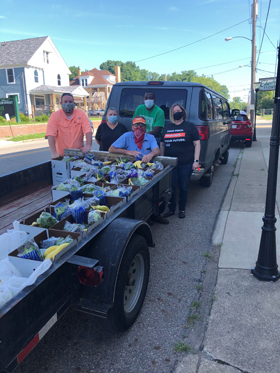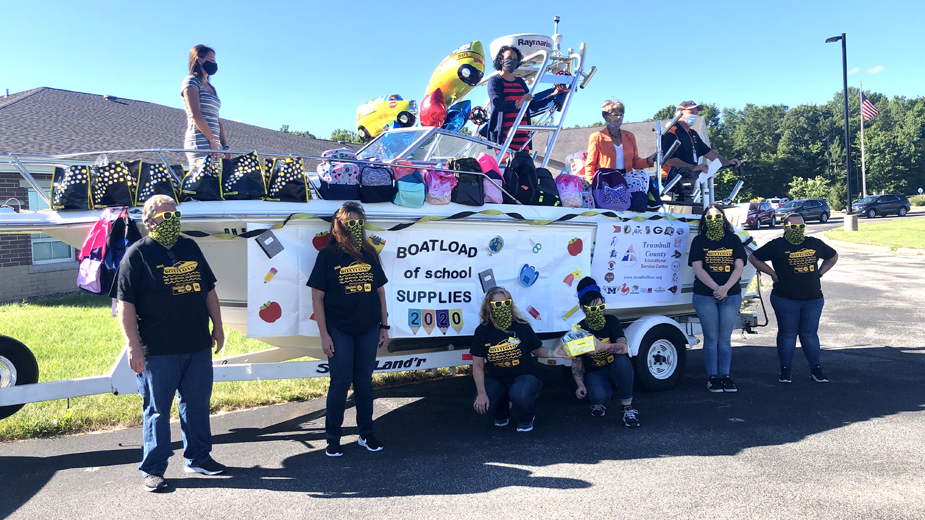YOUNGSTOWN, Ohio – The YWCA Mahoning Valley didn’t stop working throughout the coronavirus pandemic. However, social distancing restrictions have forced the nonprofit to curb one of its chief revenue streams – events.
It began with the YWCA’s annual International Women’s Day in March, which was canceled the night before the event, says its president and CEO, Leah Merritt. “And we never cancel things. We don’t even take snow days.”
While government funding makes up the bulk of the YWCA’s annual budget, events and space rentals account for about $50,000 of annual revenue, Merritt says. Some events were adjusted to a digital format. But overall the trend has affected the ability to raise money for the YWCA discretionary fund, she says.
In an effort to support nonprofits like the YWCA, the three largest foundations in the Mahoning Valley – the Youngstown Foundation, Community Foundation of the Mahoning Valley and the Raymond John Wean Foundation – collaborated in April to create the Mahoning Valley COVID-19 Crisis Relief grant program.
“We saw the need, especially early on, as everything was upended so abruptly especially around food and some other emergency assistance needs,” says Shari Harrell, president of the Community Foundation.
Through a joint application, each foundation addressed funding requests as they came in. This enabled them to meet community needs more quickly, as well as collaborate on certain applications.
“We were able to collectively fund,” Harrell says, to let the dollars go further.
“It’s made a tremendous impact,” says Jan Strasfeld, executive director of the Youngstown Foundation. “It’s allowed more streamlined applications than what we would normally see in any round of grants.”
Strasfeld announced in July that she would be stepping down after 14 years at the helm. Strasfeld says the foundation is getting toward the end of the search for her replacement. She plans to stay on as long as necessary to help the transition.
The Youngstown Foundation made more than 100 grants because of COVID, amounting to more than $800,000, Strasfeld says.
Small grassroots organizations typically received anywhere from $1,000 to $5,000, while the largest grant to an established institution was about $25,000, she says.
In addition to the grants issued through the joint effort, the Youngstown Foundation continues to make quarterly grant distributions from its unrestricted fund.
Through its support fund, in which the foundation awards an additional 10% on top of qualified contributions, it awarded nearly $2 million to local nonprofits through local donors, Strasfeld says.
The Wean Foundation made 29 COVID-related grants to area agencies, totalling $340,300, says the foundation’s president, Jennifer Roller.
The pandemic showed the foundations they needed to be nimble to respond to what the community needs most, she says.
Now, area foundations are seeing fewer applications as the need shifts more toward stabilization of nonprofit services, Roller adds. And foundations understand that COVID-19 isn’t over.
“In a crisis, you do what needs to be done,” she says. “We at least need to be prepared for the second wave.”
The collective effort of the foundations “was a blessing” for the YWCA, which secured some of those dollars heading into 2021, Merritt says.
“Because the tax base is now smaller from all of the economic impact, we don’t know what to expect next year. That is our biggest concern,” she says. “You’ve got to have a Plan A and a Plan B for everything, because you just don’t know.”
That uncertainty permeates the foundations’ focus heading into the new year. With no extension in sight for the federal government’s eviction moratorium, which is set to expire at the end of the year, foundation leaders are forecasting a need for housing help.
For families whose financial position worsened during the pandemic, “staying in the house is a real concern,” says Ginny Pasha, president of the United Way of Trumbull County.
Some funds are going to agencies that deal directly with housing. “But as with many things, they come with strings,” she says. “It’s one time.”
The Trumbull United Way has donors who “very generously” provided funds to address rent and utility assistance, Pasha says. The organization also has some COVID funds left in reserve.
“We were very judicious in using those. So we will be able to provide support to our partner agencies on the front line dealing with this,” Pasha says. “Everybody’s expecting a surge in rent issues after the first of the year.”
Mental health is a top issue as well.
Data from the Help Network of Northeast Ohio’s 211 hotline shows that for all the calls from Trumbull County, “the No. 1 call was for mental health counseling,” Pasha says. “And it was significant. It was around 350.”
The YWCA has seen spikes in the need for mental health services among its clients and even some staff as they adjust to the “new normal,” Merritt says.
For residents who live in transitional and permanent housing, the isolation is particularly challenging, she adds.
Case managers reached out to residents via phone calls and texts, and the YWCA partnered with the Ryan Giambattista HELMS Foundation of the Mahoning Valley to provide art therapy kits for adults and children.
“That has helped them beat some of that isolation,” Merritt says.
Meanwhile, the YWCA is already seeing housing needs “at the brink,” Merritt says, adding that housing is intertwined with racial and mental health issues.

“It all goes back to poverty, living wage, racism because housing is a social determinant of health,” she says. “And we know that your ZIP code is tied to your life expectancy.”
Wean has been laying the groundwork for racial equity work since 2016.
“This puts us in a positive position to be proactive in terms of continuing the training that we’ve been doing for a few years,” Roller says.
Wean and the Community Foundation collaborated to reach out to Black and minority-led organizations, both grassroots and established nonprofits, to start building upon those relationships, she says.
The effort has created a network of up to 40 such organizations. “And it’s starting to connect the dots,” Roller says.
In 2021, Wean will offer seven “Race Equity and Inclusion” trainings, including one with law enforcement, and will roll out its “Race Equity Theory of Change” initiative, which centers on empowering residents by engaging community stakeholders and partners, she says.
“What we know now is we won’t get there without being incredibly intentional about the folks that we’ve been leaving behind,” Roller says. “And that is Black and people of color.”
The YWCA looks to roll out its “Stand Against Racism” 21-day challenge for racial justice and social equity, Merritt says, as well as a virtual “lunch and learn” series over Zoom.
“We want to partner with people who are already doing the work,” she says. “We don’t want to duplicate anything. How can we enhance it? How can we take it to the next level?”
As nonprofits plan for 2021, foundations will work to help them stay afloat, says the Community Foundation’s Harrell. And the foundations will likely continue to use the common application moving into 2021.
“It’s a tool that we will consider how best to utilize it going forward,” Harrell says. “There are some collective issues we can work toward where the common application can be a helpful tool.”
Harrell, Strasfeld and Roller still talk weekly to ensure grant checks are getting out the door quickly, she says. As nonprofits adapt services to the current environment – services that might not have necessarily been offered in March, April and May, such as after-school programs – the foundations “will continue to see a shift in what kinds of things need to be funded to keep the organizations afloat,” Harrell says.
“We’re doing a lot of community outreach to understand the needs of the nonprofits. We’re doing grantmaking in a way that doesn’t burden them, but provides them the support they need to get through this odd time.”
Pictured: United Way of Trumbull County President Ginny Pasha joins the Trumbull County Educational Service Center and members of the Dollar General store district team, led by Delinda Reiter, to deliver a “boatload of schools supplies” as part of the Striving Readers Grant. Supplies were delivered to six county school districts. Image: United Way of Trumbull County
